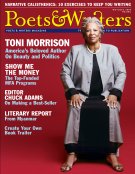"When I received that," says Wynne, "I called Caron on the phone and I told her that I felt we should sever our relationship with Stacey Brown, that we weren't going to benefit from pursuing this any further." On July 19, just five days after the dispute over the cover design began—during which time all communication was made through e-mail—the editors sent Brown a letter stating that because she was "attempting to control every aspect of the book's design" and refusing "to move forward with publication simply because your picture is not featured on the back cover," they concluded that she was unable to "comply with the requirements" of the signed contract and revoked the award, asking that she return the thousand dollars in prize money, plus the two hundred dollars spent securing artwork for the cover. The editors went on to say that the contract between Cider Press and Brown remained "valid and in effect." Should Brown repay the twelve hundred dollars, the editors wrote, the rights to Cradle Song would be transferred back to her.
The contract, however, makes no mention of Brown's having ultimate approval over the final design of the book. So why didn't Andregg and Wynne simply ignore Brown's continued reluctance and go to press with the version of the book they thought was best? "She had poisoned the well," says Andregg. Wynne says the decision was based partly on wanting to avoid the experience they had with the prior book contest ("which I cannot for legal reasons detail," he says), where there were issues with the author postpublication. "We really felt in many ways disrespected and wronged by how Ms. Brown handled this. From an emotional standpoint, honestly, we did not want to continue working with her in any way. And I don't think that's an unfair response, given how things went down."
"I never saw it coming," says Brown of the revocation of her award. "I had made a commitment to them...and I had withdrawn the book from four other contests in which it was a finalist. We were in it together, and I just assumed we would work out a compromise—or not. Maybe they would just go ahead with the book, as was their right, and I would just be grumbly about not having my picture on it."
"A book is the work of many hands," says Copper Canyon Press's executive editor, Michael Wiegers, of the collaborative spirit that is the hallmark of a successful author-publisher relationship. "I think that there needs to be a lot of give-and-take, and just as the editor needs to respect the poet's work, the poet needs to respect the editor's work and realize they are coming at it with a degree of experience. As an editor, you've got to be your author's best advocate, but as an author you can't micromanage; otherwise, self-publish."
Indeed, after Brown posted her perspective on the situation on her blog in late August, some of the poets who contributed to the ensuing discussion in the blogosphere suggested alternatives to book awards, including starting one's own press and print on demand. Of course, the lamentable details of one author-publisher relationship needn't sour the contest experience for all writers, but at the very least, authors should carefully research the presses that sponsor those contests to which they submit their work. Such research includes taking a look at the books those presses have published—if only to make sure the back covers are designed to their liking—and even asking previous winners about their experience, including the level of input they had in editorial and design decisions. "If I had it to do over again, I would have researched the press more carefully," says Brown, who purchased Cider Press's first two titles after she found out she had won the award.
"Some poets would have gone along with it, I know," Brown adds. "Those people surely think I'm a fool for arguing about things like keeping blurbs intact because for a lot of people, just getting the book is the goal. For me, the goal was to get the book right."
"It was a learning experience for us," says Wynne. "But at the same time, it's very frustrating and saddening to me that some authors don't appreciate the joy and wonder and accomplishment of getting their work published.... We're updating the contract, and the money she spent to threaten us with legal action ended up benefiting us because we got a very detailed account of what was wrong with our contract from her lawyer."
Shortly after revoking Brown's award, Wynne and Andregg named Robin Chapman, who was one of seven other finalists, the new winner of the 2007 contest. Her collection Abundance is scheduled for publication next February. A little over a month after Cradle Song was orphaned, the book was picked up by C&R Press in Chattanooga, Tennessee. It will be published next January.
Kevin Larimer is the deputy editor of Poets & Writers Magazine.








